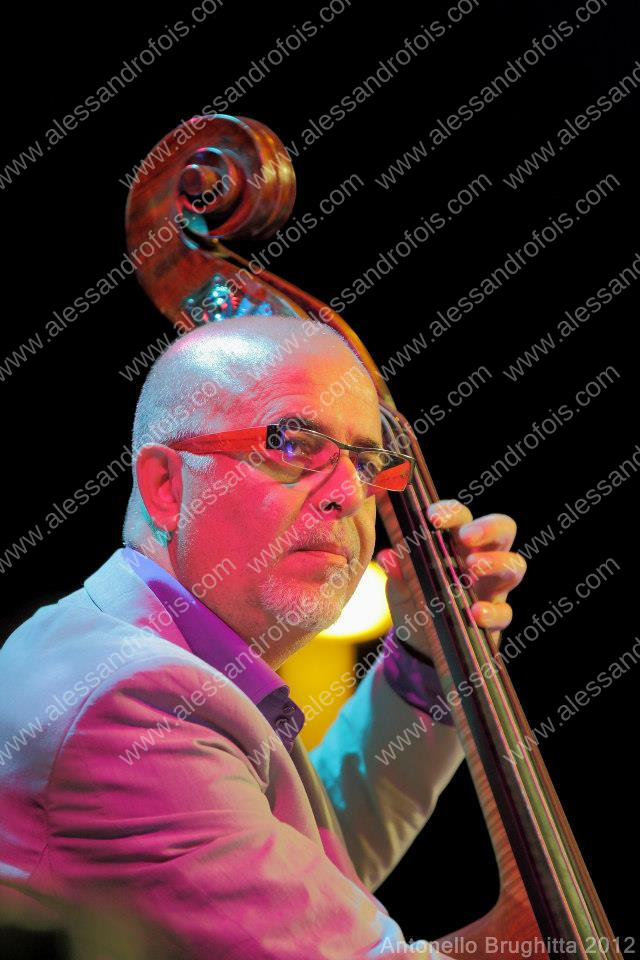Phrasing in improvisation
- Author Profile
- Recent posts
Interested in jazz, classical music on original instruments, radical improvisation. Diploma from the Cagliari Conservatory. He has been active on the jazz scene since around 1980. He has played in symphony, opera and chamber music orchestras since 1985. He has been teaching double bass since 2001, and classical double bass, jazz and ensemble music at the Cagliari Conservatory since 2004.
Reflection on musical phrasing in improvisation
It takes a true top musician to improvise a melody in his or her head amidst the blizzard of chords moving incessantly in time, and it takes an even more experienced musician to NOT playing all the scales, patterns and language elements he has practised for hours and hours in his life.
Many people do not realise how much work and concentration it takes to get to the point where they can freeing from theory and play something that we are feeling at the time.
This idea of phrasing and creating meaningful musical phrases is one of the aspects of improvisation that is missing from many musicians' solos. Improvisation is not just using scales or inserting patterns into a chord progression, it is above all creating music and inventing personal melodies.
WHAT IS A MUSICAL PHRASE?
When we improvise a musical phrase, we basically become composers who create new melodies on imprint on an established harmonic progression. Therefore, studying composition, or at least becoming familiar with elements of composition, is essential to creating an effective musical phrase.
Let us consult some passages from the manual Fundamentals of Music Composition by Arnold Schoenberg.Schoenberg opens the discussion by focusing on the musical phrase, and the same concepts apply to improvisation:
- "The smallest structural unit is the phrase, a kind of musical molecule consisting of a number of integrated musical events, which possesses a certain completeness and is well suited to combining with other similar units."
- "The term phrase structurally means a unit that can be approximated to what a person can singing in one breath. Its ending suggests a form of punctuation, like a comma."
- "The mutual structuring of melody and harmony is difficult at first, but the composer should never invent a melody without having consciousness of its harmony."
- "Rhythm is particularly important to form a sentence. It helps create interest and variety, establishes character, and is often the determining factor in establishing sentence unity."
From this we can deduce that -according to Schoenberg- the effectiveness of a sentence depends on three factors:
- Thinking in terms of the completeness of the musical phrase.
- Awareness of the harmonic background.
- Playing with rhythmic definition.
The idea of phrasing is very important in Schoenberg's music. Abandoning conventional harmony, chordal construction, and ignoring the push of V7 towards I in his compositional system, the melody and phrasing of each piece are decisive for the listener, and this is what Schoenberg was very aware of.
Hearing a musical phrase being spoken and developed is innate in every listener, whether done deliberately as a study by a musician or unconsciously by the casual listener.
The non-musician when listening to bebop may be as bewildered as a student hearing twelve-tone music for the first time, but in both cases the natural inclination towards melody and repetition are the lifeboat that saves us when we get lost in the sea of unknown harmony.
NO SENTENCES, NO LISTENERS
Observing the audience at a concert and their reactions to a particular musician can be very instructive in this regard. Sometimes people are attentive to every note, other times they are distracted or tell each other their lives over a beer.
Apart from the differences of interest that may exist in the particular audiences, what distinguishes certain musicians from others?
When a musician fails to get the listener's attention, it is often (but not always) for one of these reasons:
- It does not make musical phrases, or play musical ideas.
- He cannot navigate harmony, he does not play chord changes, he gets lost in the structure.
- Plays without any harmonic and/or rhythmic character, ties 8 notes together without meaning or plays without respecting the tempo or rhythmic content of the music.
If the above definitions are anything like our solos, it will be difficult to find a willing listener for a whole solo.
The same phenomenon happens when listening to someone speaking in public. If they are unprepared, unfamiliar with the subject matter, or talk in circles, the audience unconsciously begins to fall asleep.
It makes a lot of sense: why waste time listening if the performer hasn't invested any to show up for a concert?
We have certainly witnessed these kinds of performances, and perhaps even been in them. All those factors destroy the connection with the listener. We get lost in the tangle of notes and chords, when we should be thinking about communicating with the public.
Scales are important, but they are for the rehearsal room, not the stage. If we want to go to the next level and want to communicate our musical message effectively, we have to go beyond the notes. We have to speak a musical language.
PHRASING PRE-REQUISITES
Understanding how a phrase sounds is important, but there are certain things we need to develop musically before improvising our phrases.
Sentences will not appear out of nowhere if we are still thinking about stairs and chord-tones. They won't come to us if we have to stop and remember what the next chord in the structure is or what key the bridge of the song goes into. If we have to think about every single note we play, it is really hard for us to think of a phrase that fits a certain passage and ties in with the whole harmonic progression of the song.
If we want to construct phrases in our solos, we need to be able to hear the different chord types, (major, minor, V7, etc.) we need to know what notes the chords are made of, we need to internalise the tempo and character of a song, we need to know the song to such an extent that we can sing the melody and chord progression.
Musical phrases do not come from the intellect or reasoning, they come from the ear and our inner musicality.
We should think in larger portions of time and understand the progression by ear. Go beyond the chord progression. Visualise mentally and by ear what the whole chorus sounds like and predict what our first phrase will be like and how we intend to develop it.
We construct our musical message for the listener not with single notes, but with complete musical periods.
DEVELOPING PHRASING
The blues is the perfect vehicle for working on phrasing, a 12-beat structure with a small harmonic movement, I-IV-I-V7-I.
The movement from grade I to grade IV and vice versa is perfect for developing a simple musical phrase: play an idea on grade I, develop it on grade IV and complete it on grade II-V. A statement and an answer.
Let's take a look at this first Miles Davis chorus on 'Blues By Five' (from Cookin'):

Let's look at these 12 jokes not from the point of view of chordal analysis, but from the point of view of the idea of phrasing. Instead of thinking about each chord, we look at these 12 bars as a single piece. Miles plays three separate phrases:

Each idea leads to the next logically and seamlessly. There is room to breathe after each sentence, and the listener can easily follow the development of the line.
When we analyse a transcribed solo on paper, we get stuck on a note-by-note approach, but that is not how we listen to music. We put on a record and realise that we do not listen note by note, we hear musical phrases and ideas. This is the way we have to think when we transcribe a solo and when we improvise a solo.
PLAY WHAT YOU WOULD SING
Another important part of phrasing is to tend towards a vocal quality in our lines, as if the notes we play were something we would naturally sing.
Chet Baker is a great example of a musician who always played what he felt. No matter whether he was playing his ideas on the trumpet or singing, there was always the same musical phrasing.
Musical phrasing is the natural result of listening to hundreds of recordings, transcribing solos and melodies, yet it is the result of developing our ear, studying theory and chord progressions and melodies to such an extent that we do not have to think about them consciously.
After some time, the idea of forming a musical phrase that we are hearing in our head will seem natural. The same way we learnt to speak, we will begin to improvise musical phrases that make sense and develop them into our solos.
Keep in mind that thinking about phrases is only the beginning. Once we are used to playing phrases, we can use other techniques to further develop our ideas. Whatever way we develop our solos, let's keep a mental attitude towards musical phrasing whenever we improvise.






Leave a Reply
Want to join the discussion?Feel free to contribute!